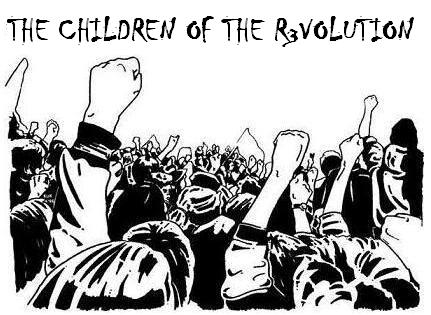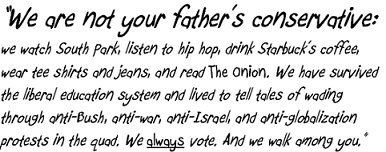 Fuel prices and healthcare costs are consuming ever increasing portions of our personal budgets. In Washington, our elected officials debate the ever contentious balancing act between burdensome taxes and record government spending on both domestic and international affairs. Both candidates have starkly differing platforms on these, the issues that are making the current economic downturn even harder for the average American. Mr. McCain and Mr. Obama are surprisingly similar in their silence, however, on an issue that is equally if not more important: the terrible decisions made by both branches of government and on both sides of the aisle that led to current economic troubles; and neither has spoken to how we rectify those mistakes. This is not political, it is pragmatic – and it cannot be addressed with rhetoric. As such, it has not been addressed at all. In the hopes that congressional and presidential candidates actually plan on doing their jobs once they reach elected office, I offer the following to help get up to speed.
Fuel prices and healthcare costs are consuming ever increasing portions of our personal budgets. In Washington, our elected officials debate the ever contentious balancing act between burdensome taxes and record government spending on both domestic and international affairs. Both candidates have starkly differing platforms on these, the issues that are making the current economic downturn even harder for the average American. Mr. McCain and Mr. Obama are surprisingly similar in their silence, however, on an issue that is equally if not more important: the terrible decisions made by both branches of government and on both sides of the aisle that led to current economic troubles; and neither has spoken to how we rectify those mistakes. This is not political, it is pragmatic – and it cannot be addressed with rhetoric. As such, it has not been addressed at all. In the hopes that congressional and presidential candidates actually plan on doing their jobs once they reach elected office, I offer the following to help get up to speed.One might ask where all of these troubles began. I could go on at length about the history of our banking system, and almost did (I had it written… be glad I spared you). Here it is in a nutshell. A bipartisan effort in the mid-1990s to ride the coat-tails of the successful small government policies of the Regan administration led to what libertarians have deemed an “over de-regulation” of our financial system. In an effort to increase competition through the removal of antiquated regulations on our financial services industry, President Clinton signed the Gramm-Leach-Bliley Act into law, repealing the Glass-Steagall Act of 1933. Glass-Steagall erected barriers between commercial and investment banking, and the reasoning behind its removal was contingent upon prudent congressional and FDIC oversight to mitigate the risks Glass-Steagall were meant to hedge. It was thought this would allow US financial institutions to become more competitive with one another (lowering costs to consumers) and more competitive on the international stage. As long as prudent oversight kept the system transparent, it should theoretically have been quite efficient. Then someone dropped the ball.
Removing these barriers opened the door for the creation of exotic and opaque financial instruments of which even seasoned financiers had trouble assessing the risk, let alone your average investor.
It is a hard and useless exercise to point fingers… but let’s try anyway. Clearly the FDIC was lax in its oversight. Private rating agencies like Standard and Poor’s must take some of the blame as well – they rated a lot of these arcane securities as risk-free which obviously was not the case. Ultimately however, the buck needs to stop at a public official – someone elected by the citizenry and subsequently appointed by his congressional peers to wield ultimate legislative authority (and responsibility) for our financial system. That man is the chairman of the Senate Banking Committee, Christopher Dodd.
Pointing fingers of course doesn’t solve anything, it just helps us know who not to go to when looking for solutions. Will Mr. Dodd ultimately answer to voters for being the man at the wheel behind the biggest financial system debacle in 20 years? Probably not. Hopefully someone will have the foresight, however, to take the keys and not let him drive again.
 So what do we do? Many argue that Fannie and Freddie, government sponsored enterprises which facilitated the creation of these arcane mortgage securities, are dragging down our financial system and need to be allowed to fail. There is some empirical evidence to support this. The Bank of China, the single largest holder of US debt securities, reduced its holdings in the GSE’s by 25% ($4.6 billion) since June, and a number of our other foreign creditors have done the same. This lack of confidence may not worry you, but it should. Decreased confidence in the GSE’s is a direct reflection of overall confidence in the American financial system. Money talks, and capital flight of that magnitude talks very, very loudly.
So what do we do? Many argue that Fannie and Freddie, government sponsored enterprises which facilitated the creation of these arcane mortgage securities, are dragging down our financial system and need to be allowed to fail. There is some empirical evidence to support this. The Bank of China, the single largest holder of US debt securities, reduced its holdings in the GSE’s by 25% ($4.6 billion) since June, and a number of our other foreign creditors have done the same. This lack of confidence may not worry you, but it should. Decreased confidence in the GSE’s is a direct reflection of overall confidence in the American financial system. Money talks, and capital flight of that magnitude talks very, very loudly.At issue, of course, is that Fannie and Freddie can’t be allowed to fail. They have, unfortunately, become load bearing pillars in our current financial system. Any thought of eliminating their significance would have to be done slowly over decades. Personally, I am a proponent of a middle ground solution. Break the GSE’s up – put the weight of our massive mortgage banking behemoth onto ten or so load bearing pillars instead of two. Eliminate any semblance of a government guarantee, and give them the ability to fail. If one does so, the ceiling doesn’t come crashing down.
I suppose it should not come as a surprise in the final months of a contentious election that an issue such as this has not been addressed by either side. As evidenced by the endless dribble above, even a brief discussion of the topic is lofty and not terribly interesting. That does not, however, diminish its importance. At a time when “change” and “fixing Washington” is what both sides are peddling, at some point we the people have to push our government to address those policy items which are actually broken. And our financial system, at the moment, is very, very broken.







6 comments:
No mention of Greenspan's management of the economy from bubble to bubble to bubble? I'm surprised.
Thank goodness we have Bernanke to weather this storm, else we'd be on course to replace Argentina as the world's great financial embarassment.
I'm here to tell you, I didn't understand a word of it but it sounded great.
Frankly, I'd like to know what, precisely, [i]would[/i] happen if the redistribution to Mr Cannizzaro's 'ten pillars' happened, say, in 48 hours, rather than over 10 years. Frankly, in our modern age of instant communications and forward-looking economics, a well-disclosed yet brutally violent upheaval of that sort, properly executed, should only cause a brief blip of severe hysteria, followed by (one would think) a level of greater consumer confidence and better asset management due to competition.
Of course, there are far too many rich people who stand to lose, so it will never be as beautifully traumatic as I could envision - no, it will drag on and on and on until the peasants, fed up with begging at the feet of the few remaining monoliths of power, throw themselves bodily into the gears of the system, clogging it such a weight of human gore that the entire system has no choice but to fail.
Ditto.
The candidates' comments:
http://www.msnbc.msn.com/id/26577811
hariolor...
your comment was a little um.. graphic.
i think i threw up a bit in my mouth just now
Post a Comment